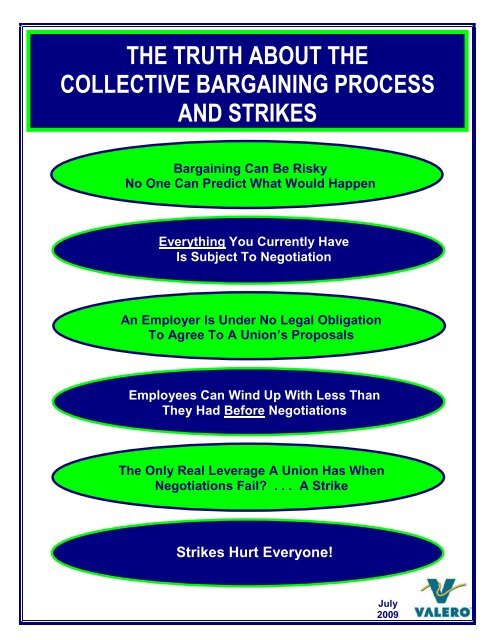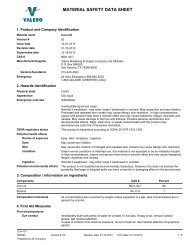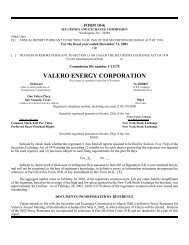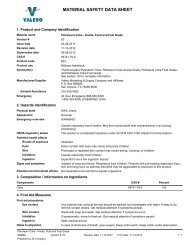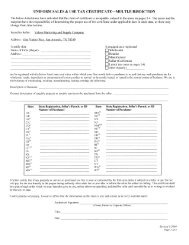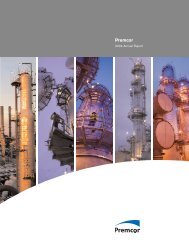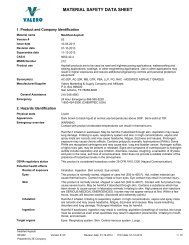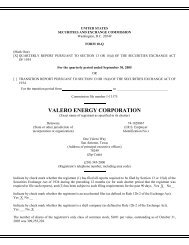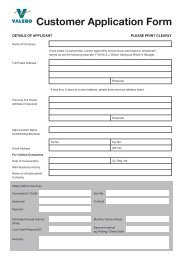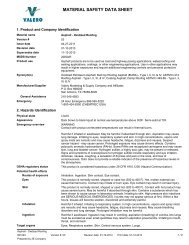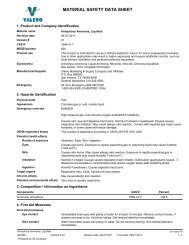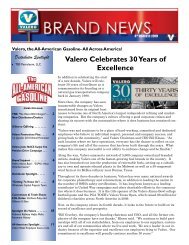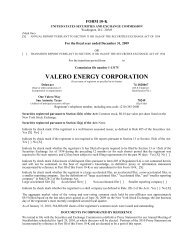Bargaining and Strikes 7-24 (web).pdf - Valero
Bargaining and Strikes 7-24 (web).pdf - Valero
Bargaining and Strikes 7-24 (web).pdf - Valero
Create successful ePaper yourself
Turn your PDF publications into a flip-book with our unique Google optimized e-Paper software.
<strong>Bargaining</strong> Can Be Risky<br />
No One Can Predict What Would Happen<br />
In Negotiations<br />
Everything You Currently Have<br />
Is Subject To Negotiation<br />
An Employer Is Under No Legal Obligation<br />
To Agree To A Union’s Proposals<br />
Employees Can Wind Up With Less Than<br />
They Had Before Negotiations<br />
The Only Real Leverage A Union Has When<br />
Negotiations Fail? . . . A Strike<br />
<strong>Strikes</strong> Hurt Everyone!<br />
July<br />
2009
Since the USW began its attempt to organize our Texas City<br />
employees, a number of questions have been asked about how<br />
unions operate <strong>and</strong> what, if anything, is to be expected of its<br />
membership.<br />
To assist you in deciding whether you want to bring the USW<br />
into your working lives, we are providing this booklet designed to<br />
provide short, truthful answers about the risks associated with the<br />
collective bargaining process <strong>and</strong> what happens when contract<br />
negotiations stall <strong>and</strong> the union calls its members out on strike.<br />
We encourage you to discuss these issues with your fellow<br />
employees, your supervisor, <strong>and</strong>/or an H.R. representative.
THE COLLECTIVE BARGAINING PROCESS<br />
<br />
1. Question:<br />
<br />
Answer:<br />
When a union gets voted into an operation, what is<br />
the company required to do?<br />
The company would have to bargain with the<br />
union. That means it would talk (“negotiate”) in<br />
good faith with the union representatives about<br />
money, benefits, etc.<br />
<br />
2. Question:<br />
<br />
Answer:<br />
What does “bargaining” mean?<br />
In bargaining, one side asks <strong>and</strong> the other side<br />
answers. The answer could be “yes” or “no.”<br />
<br />
3. Question:<br />
<br />
Answer:<br />
Does that mean that a company can say “no” to a<br />
union request?<br />
Yes. A company is under no obligation to agree to<br />
something that it doesn’t want or doesn’t think is<br />
good for the company.<br />
<br />
4. Question:<br />
<br />
Answer:<br />
Would employees automatically get a contract with<br />
improved pay <strong>and</strong> benefits if they vote in the<br />
USW?<br />
No. When a union becomes the collective<br />
bargaining representative for employees at a<br />
company, it simply gains the right to ask the<br />
2
company for better pay <strong>and</strong> benefits. Three things<br />
could happen as a result of good-faith<br />
bargaining—pay <strong>and</strong> benefits could be improved,<br />
be reduced, or stay the same. In one well-known<br />
case, the National Labor Relations Board<br />
explained the risks associated with the collective<br />
bargaining process:<br />
“Collective bargaining is potentially<br />
hazardous for employees <strong>and</strong> that as a result<br />
of such negotiations, employees might<br />
possibly wind up with less . . . .” [Coach <strong>and</strong><br />
Equipment Sales Corp., 228 NLRB 440, 441.]<br />
This is exactly what happened at Bridgestone<br />
Firestone two years ago where the USW negotiated<br />
a contract calling for a 17 percent pay cut for new<br />
hires <strong>and</strong> more employee contributions to the cost<br />
of health care insurance. Here’s a copy of the<br />
article from the Bureau of National Affairs<br />
reporting the contract:<br />
3
5. Question:<br />
<br />
Answer:<br />
You mean a union can’t automatically get<br />
employees the things the union organizers had<br />
promised?<br />
That’s right. The company does not have to make<br />
a union’s promises come true. In fact, under the<br />
law, a company is not even obligated, under some<br />
conditions, to agree to continue presently existing<br />
wages or benefits:<br />
“There is, of course, no obligation on the<br />
part of an employer to contract to continue<br />
all existing benefits, nor is it an unfair<br />
labor practice to offer reduced benefits.”<br />
[Midwestern Instruments, Inc., 133 NLRB 1132, 1138]<br />
<br />
6. Question:<br />
<br />
Answer:<br />
The union organizers are telling us that with the<br />
union, we’ll get everything we have now, plus<br />
more, <strong>and</strong> no dues until then. Is this true?<br />
Regardless of what the organizers may have told<br />
you, collective bargaining on a union contract<br />
does not start from a guaranteed base of the<br />
present wages <strong>and</strong> benefits. All present wages<br />
<strong>and</strong> benefits are as much a subject of negotiations<br />
as are dem<strong>and</strong>s for additional wages <strong>and</strong> benefits.<br />
It is not unusual for a union to wind up trading<br />
existing employees’ benefits for union benefits,<br />
such as automatic checkoff of dues.<br />
<br />
7. Question:<br />
<br />
Answer:<br />
What is “dues checkoff”?<br />
When a union wins an election <strong>and</strong> attempts to<br />
negotiate a contract, one of the most important<br />
parts of the contract to the union is the “dues<br />
4
checkoff” clause. A checkoff clause allows the<br />
union to receive dues money directly out of its<br />
members’ paychecks without their members ever<br />
seeing the money. It’s just like another tax<br />
withholding. The members’ paystubs would show<br />
an automatic deduction for federal taxes, a<br />
deduction for state taxes, <strong>and</strong> another deduction<br />
for union dues. Here’s a sample USW checkoff<br />
clause:<br />
ARTICLE 4<br />
CHECK-OFF<br />
4.1 The Company agrees to collect Union dues with a monthly payroll<br />
deduction <strong>and</strong> remit promptly to the International<br />
Secretary/Treasurer of the United Steelworkers of America, at a<br />
place designated by the International Treasurer, dues <strong>and</strong> initiation<br />
fees uniformly required of all Union members as designated<br />
by the International Treasurer of the Union, for all employees<br />
within the appropriate unit who voluntarily execute “an authorization<br />
for check-off dues” <strong>and</strong> cause it to be placed in the h<strong>and</strong>s of<br />
the Company. The Company agrees to submit each month to the<br />
Union a Union Dues Deduction Listing showing name, clock<br />
number, <strong>and</strong> amount of monthly dues paid.<br />
Importantly, a union does not have an automatic<br />
right to get a dues checkoff clause included in a<br />
negotiated contract. So, in order to get a company<br />
to agree to dues checkoff, the union often must<br />
give up something that workers already have.<br />
<br />
8. Question:<br />
<br />
Answer:<br />
How long does it take to negotiate a contract if a<br />
union wins an election?<br />
Good-faith negotiations between a company <strong>and</strong> a<br />
union can take months or even years, <strong>and</strong> there is<br />
no guarantee that an agreement will ever be<br />
reached through good-faith negotiations.<br />
5
9. Question:<br />
<br />
Answer:<br />
Can a company give its employees wage <strong>and</strong><br />
benefit increases during contract negotiations<br />
between the company <strong>and</strong> a union?<br />
No. During the period of negotiations, a company<br />
cannot unilaterally grant employees wage <strong>and</strong><br />
benefit improvements, even if those improvements<br />
are granted to nonunion employees at its other<br />
facilities. [NLRB v. Fitzgerald Mills Corp., 313 F.2d 260 (2d Cir.)]<br />
<br />
10. <br />
Question:<br />
With respect to the collective bargaining process,<br />
who has the final word regarding acceptance or<br />
rejection of a contract, the members who come<br />
under the contract . . . or the union?<br />
<br />
Answer:<br />
The USW International Union in Pittsburgh,<br />
Pennsylvania, has the final say. Article XVII,<br />
Section 1, of the USW Constitution states:<br />
“The International Union shall be the<br />
contracting party in all collective<br />
bargaining agreements <strong>and</strong> all such<br />
agreements shall be signed by the<br />
International Officers.”<br />
<br />
11. Question:<br />
What can happen when a company <strong>and</strong> union<br />
cannot agree on a contract?<br />
<br />
Answer:<br />
When a company refuses to give in to<br />
unreasonable union dem<strong>and</strong>s, the only real<br />
leverage a union has is to call its members out on<br />
strike.<br />
6
UNION STRIKES<br />
<br />
12. <br />
Question:<br />
<br />
Answer:<br />
Could the USW call us out on strike?<br />
Yes. The USW has called more strikes than most<br />
other unions. In fact, since 1999, the USW has<br />
called 299 strikes involving tens of thous<strong>and</strong>s<br />
of workers. (Source: Labor Relations Institute.)<br />
The Labor Relations Institute (LRI) publishes a<br />
monthly newsletter, Labor Relations Ink, which<br />
includes “Union Scoreboard,” providing the most<br />
current strike statistics published by the National<br />
Labor Relations Board. A copy of LRI’s June 2009<br />
edition of Union Scoreboard is shown below:<br />
7
Most telling in this “Union Scoreboard” is the fact<br />
that only one union—the infamous Teamsters—<br />
currently has more strikes going on nationwide<br />
than the USW.<br />
<br />
13. Question:<br />
<br />
Answer:<br />
Does the USW have a history of strikes in Texas<br />
<strong>and</strong> our adjoining states?<br />
Yes. As indicated in the map below, the USW has<br />
had 23 separate strikes in Texas <strong>and</strong> adjoining<br />
states in just the past 20 years.<br />
<br />
14. Question:<br />
Will a union financially support its striking<br />
members during one of their strikes?<br />
8
Answer:<br />
The USW has a “strike fund” that pays out $100 -<br />
$175 per week depending on the Local’s dues<br />
structure. That’s certainly not enough to pay the<br />
mortgage, car payment, <strong>and</strong> put food on the table.<br />
Strikers also have to “walk to eat,” meaning those<br />
who do receive strike benefits are required to walk<br />
the picket line.<br />
<br />
15. Question:<br />
<br />
Answer:<br />
When the USW calls a strike, do all affected<br />
members have the choice of striking or continuing<br />
to work during the strike to support their families?<br />
No. Article XXIII, Section 1B3(i), of the USW<br />
Local 13-1 By-laws specifically states that<br />
members shall be subject to discipline for<br />
“crossing a picket line sanctioned by the<br />
International Union or the Local Union in which the<br />
member holds . . . his/her membership.”<br />
<br />
16. Question:<br />
What does that mean—disciplined for crossing a<br />
USW picket line?<br />
<br />
Answer:<br />
If the union believes you have broken one of its<br />
rules, like crossing one of its picket lines to work<br />
during a strike, it can bring charges against you,<br />
<strong>and</strong> you can be tried by a union tribunal. Here’s<br />
the provision in the USW Constitution allowing for<br />
members to be tried:<br />
9
17. Question:<br />
<br />
Answer:<br />
What happens if a member is found guilty of<br />
crossing a picket line <strong>and</strong> working during a USW<br />
strike?<br />
You can be fined!<br />
<br />
18. Question:<br />
<br />
Answer:<br />
How much can a member be fined?<br />
There’s no limit. Neither the USW Constitution nor<br />
the Local 13-1 By-laws set a cap on the amount a<br />
member could be fined. When a member crosses<br />
a picket line to work during a strike, unions often<br />
fine the individual an amount equivalent to how<br />
much the member earned during the time he/she<br />
was working rather than striking. It could be<br />
thous<strong>and</strong>s of dollars!<br />
As an example, three USW members of Local 2 in<br />
Akron, Ohio, were recently each fined $625 when<br />
they crossed a USW picket line to work during a<br />
strike. Another union member, Barbara Williams,<br />
was fined $2,500 by her union when she refused to<br />
walk off her job during a strike. Another union<br />
member, James Patterson, crossed his union’s<br />
picket line <strong>and</strong> worked during a 50-week strike. He<br />
was fined $40,000.<br />
Several years ago, the Teamsters fined over 70 of<br />
its members from $200 to $13,000 per member<br />
when they refused to walk off their job in support<br />
of the United Food <strong>and</strong> Commercial Workers Union<br />
10
strike against several grocery chains. All totaled,<br />
the assessed fines exceeded $120,000. (See<br />
Attachment A.)<br />
<br />
19. Question:<br />
<br />
Answer:<br />
What happens to employees who choose to<br />
support a union strike by refusing to cross a picket<br />
line?<br />
Strikers . . .<br />
• Lose their wages;<br />
• Cannot collect unemployment compensation while<br />
staying out of work on strike;<br />
• Must pay full premium if choose to continue medical<br />
benefits; <strong>and</strong><br />
• Can be permanently replaced in strikes over union<br />
economic dem<strong>and</strong>s.<br />
<br />
20. Question:<br />
What do you mean strikers can be “permanently<br />
replaced”?<br />
<br />
Answer:<br />
By law, companies have a legal right to continue<br />
operating during a strike by hiring permanent<br />
replacements. When the union finally calls off the<br />
strike, the strikers do not have an automatic right<br />
to their job after the strike if they are permanently<br />
replaced. Permanently replaced strikers can only<br />
ask for a job back <strong>and</strong> wait around hoping for a<br />
vacancy to occur in some job they can perform.<br />
11
21. Question:<br />
<br />
Answer:<br />
Can peaceful strike picketing erupt into violent<br />
confrontations?<br />
Yes. Unfortunately, when strike activity occurs, it<br />
is often accompanied by violence. During the<br />
USW strike at AK Steel in Mansfield, Ohio, for<br />
example, angry mobs of strikers attacked convoys<br />
bringing in replacement workers. Explosive<br />
devices were found hidden on company property.<br />
The fuses had been lit, but failed to ignite. Molotov<br />
cocktails were placed beside oxygen-hauling<br />
trucks. Pipe bombs were thrown into the plant <strong>and</strong><br />
exploded. Explosive devises were also placed in<br />
the home mailboxes of numerous salaried AK<br />
Steel employees. One company truck driver was<br />
hospitalized after a bomb was thrown at his truck.<br />
(See Attachment B, Testimony before U.S. House of<br />
Representatives Subcommittee investigating workplace violence.)<br />
<br />
22. Question:<br />
<br />
Answer:<br />
How long do strikes last?<br />
<strong>Strikes</strong> can last a short period of time . . . or drag<br />
on for months or years. For example:<br />
• The USW strike at Mansfield Plumbing Products in<br />
Kilgore, Texas, lasted 26 weeks.<br />
• The USW strike at Rocky Mountain Steel Mill in Pueblo,<br />
Colorado, lasted 6 years, 3 months, <strong>and</strong> 11 days.<br />
• The USW strike at Speedrack in Hamilton, Alabama,<br />
lasted 20 months, <strong>and</strong> many of the strikers could not<br />
immediately reclaim their old jobs because they had<br />
been filled with permanent replacements.<br />
• The USW strike at Aitkin Iron Works in Aitkin, Minnesota,<br />
in 2004 lasted 5½ months.<br />
12
23. Question:<br />
<br />
Answer:<br />
Can a strike affect job security?<br />
Absolutely. <strong>Strikes</strong> occasionally result in<br />
permanent shutdowns because the struck<br />
company loses part of its market share during the<br />
strike to its more reliable competitors.<br />
<br />
<strong>24</strong>. Question:<br />
<br />
Answer:<br />
How much could a USW strike cost <strong>Valero</strong>-Texas<br />
City employees?<br />
Depending on your hourly pay rate, you could<br />
st<strong>and</strong> to lose many thous<strong>and</strong>s of dollars if the<br />
USW called a strike at our Texas City operation.<br />
For example, the 2005 USW strike at Cooper Tire &<br />
Rubber in Texarkana, Arkansas, lasted<br />
21 workdays. The recent USW strike at Gerdau<br />
Ameristeel in Vidor, Texas, lasted 137 workdays,<br />
<strong>and</strong> the USW strike at Speedrack in Hamilton,<br />
Alabama, lasted 20 months. Shown below is a<br />
“Strike Cost Calculator” chart, which gives you an<br />
idea how costly a union strike can become:<br />
*Calculated based on a 40-hour workweek with no overtime.<br />
Please see your supervisor or an H.R. representative if you have any questions<br />
about this collective bargaining <strong>and</strong> strike information.<br />
13


